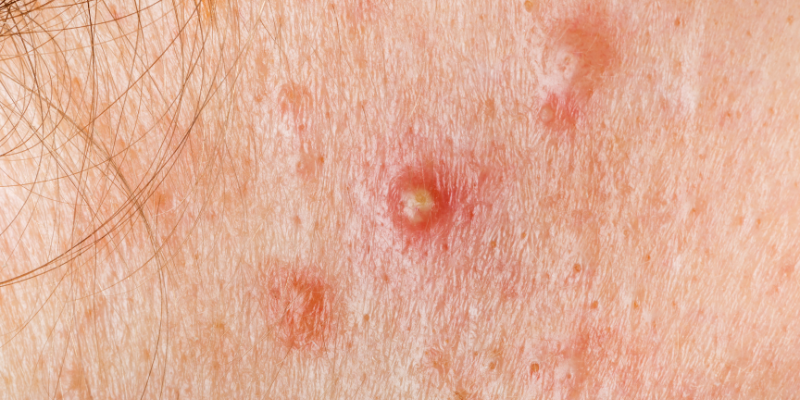does vitamin A help with acne? Benefits, Dosage, Topical vs. Oral
Acne is a common skin disorder in all age groups, and even though multiple etiologies are involved, vitamin A has been well-appreciated as an active therapeutic approach. Vitamin A plays several roles in the skin in terms of maintenance, turnover, and reduction of inflammation for cells. Thus, vitamin A helps prevent acne by regulating its oil production, hence not forming pores. The benefits of Vitamin A on acne treatment, the proper dose, and the efficacy compared between the topical and oral forms are discussed. One can lead oneself to more precise and healthier skin based on how Vitamin A works.
What Is Vitamin A?
Vitamin A is a fat-soluble vitamin responsible for many bodily functions, such as maintaining healthy vision, facilitating the immune system, and keeping the skin healthy. There are two main kinds of Vitamin A: preformed Vitamin A, retinol, and pro vitamin. A carotenoid, which also includes beta-carotene. Both forms are essential, but retinol is the most commonly found in skincare products because it actively affects skin health.

How does Vitamin A help with acne?
Vitamin A possesses several properties that account for its efficacy in managing acne. Here's how it works:
Stimulates Cell Turnover
Acne usually occurs when dead skin cells pile up and cause blockage in the pores. This blockage develops into pimples, blackheads, and cysts. Vitamin A is significant in increasing cell turnover, accelerating the shedding of old, dead skin cells, and encouraging the production of new, fresh skin cells. This Vitamin helps prevent the accumulation of dead skin cells, which might otherwise lead to clogged pores and acne breakouts.
Reduces Inflammation
Inflammation is a significant contributor to acne. Since the pores get blocked with dead skin cells and excess sebum, bacteria can become trapped inside them, thus resulting in inflammation, redness, and swelling of the affected area. In this respect, more severe forms of acne, such as cystic acne, require vitamin A, known to reduce inflammation, thus providing comfort and calming the skin.
Regulates Sebum Production
The primary cause of acne is excessive sebum production, an oily substance produced by the sebaceous glands. These dead skin cells and sebum result in clogged pores that cause acne. Vitamin A regulates sebum production so your skin won't be too oily, resulting in less possibility of blocked pores and breakouts.
Prevents Scarring of Acne
Acne lesions, especially inflamed and infected ones, can cause scars even after the breakout has healed. Vitamin A is an essential vitamin in the healing process of the skin. It helps in the regeneration of healthy skin, which heals damaged tissue and prevents the development of permanent scars. Vitamin A minimizes the severity of acne scars by encouraging faster and more effective wound healing, leaving the skin looking smoother and more even in tone after an acne breakout.
Vitamin A Dose for Acne
When using Vitamin A to treat acne, it is worth noting that proper dosing should be followed to avoid side effects such as irritation or toxicity. The recommended dosage will vary depending on topical or oral Vitamin A.
Dosage of Topical Vitamin A
Topical Vitamin A products include retinoid, which should be applied once daily, preferably at night. The strengths vary, with standard formulations being retinol, available over the counter, and more potent prescription retinoid like retinoid. Start with the lowest concentration to minimize irritation, then gradually increase the strength as your skin builds tolerance.
Topical retinoid treatments should be administered on clean, dry skin, and sunscreens during the day should be worn since Vitamin A makes your skin more sensitive to the sun. If irritation develops, this may be mitigated through reduced frequency or concurrent use of a moisturizer.
Vitamin A Oral Dosage
Oral Vitamin A is usually prescribed for more serious acne that does not respond to topical treatments; usually, it is given in the form of isotretinoin, also known as Accutane. Patients must take the drug as advised by their healthcare provider; overdose may lead to toxicity.
Doses for individuals on isotretinoin are usually based on body weight. Most patients start showing noticeable improvements within 4 to 6 months of treatment. Checkup appointments during isotretinoin must be done regularly because side effects can include dry skin, liver function abnormalities, and blood lipid levels.

Topical Vitamin A vs. Oral Vitamin A for Acne
Topical and oral Vitamin A treatments are effective for acne but work differently and are used for different types of acne severity. Let's look at the key differences between the two:
Topical Vitamin A for Acne
Targeted Treatment: Topical Vitamin A, such as retinoids, works directly on the skin, targeting the clogged pores, excess sebum, and Acne inflammation. These drugs are generally used for mild to moderate acne.
- Slow Results: It may take several weeks to see noticeable changes with topical Vitamin A treatment, as they work on cell turnover and reduction in oil production over time.
- Less Systemic Side Effects: Topical preparations are less likely to cause side effects than oral Vitamin A since the action is limited to the skin and not absorbed into the body.
Oral Vitamin A for Acne
For severe acne, oral vitamin A (isotretinoin) is given to those with severe acne resistant to other treatments. This inside-out effect affects the entire body by reducing sebum production and shrinking the sebaceous glands.
- More Effective, yet Riskier: Oral Vitamin A is often more rapid and dramatic in results than topical treatments. However, it is associated with more side effects and needs constant monitoring by a healthcare professional.
- Systemic Side Effects: Oral Vitamin A leads to side effects like dryness of the skin, pains in the joints, and increased sensitivity to the sun. Following the prescription and getting regular checkups during the treatment period is essential.
Conclusion:
Vitamin A is a powerful and versatile ingredient to combat acne. It is administered topically as retinoid or orally as isotretinoin, reducing acne cases, preventing scarring, and giving the skin a more transparent, healthier look. Understanding the benefits, dosage, and differences between topical and oral treatments will lead you to a more informed decision on applying Vitamin A to your treatment plan for acne.












